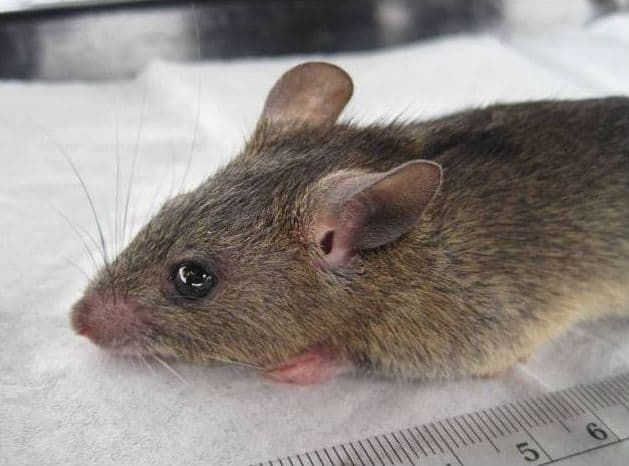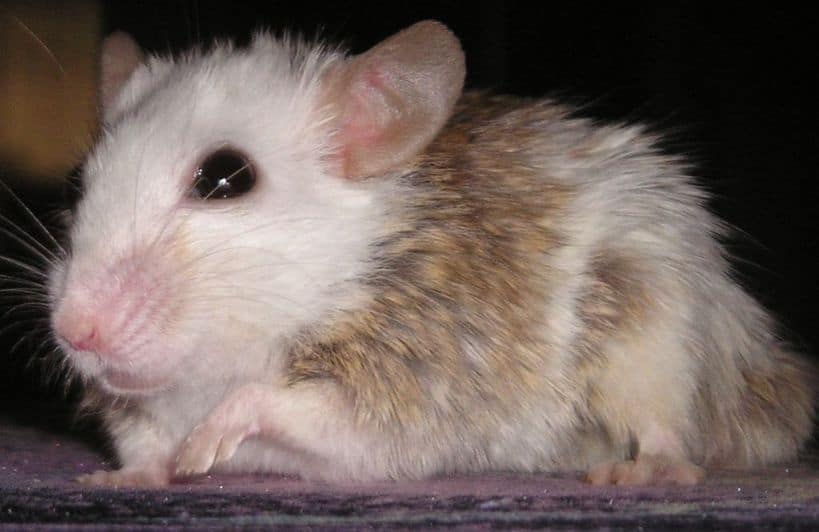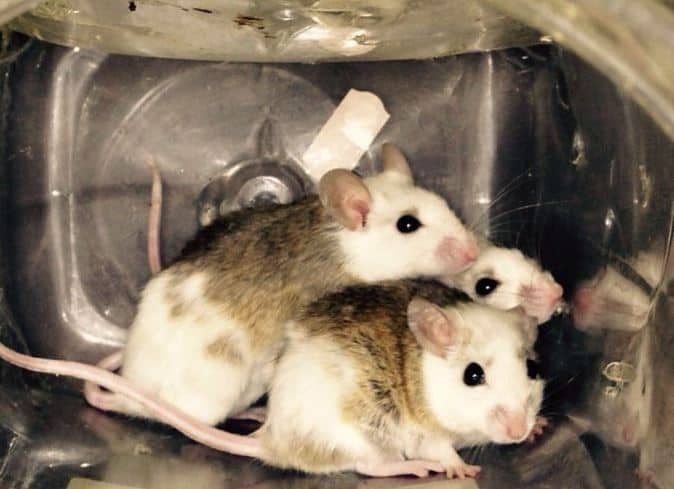The African Soft Fur Rat is a rodent species that is relatively new to the pet trade. Whereas fancy rats and mice have been kept as pets for hundreds of years, the African Soft Fur Rat has been kept in captivity for a much shorter time.
As a result of this, many people do not know too much about them. This is a shame because these little rodents can make for very interesting pets for the right owner.
If you’re considering getting an African Soft Fur Rat as your next companion, here’s everything you need to know about them!

African Soft Fur Rat Care Sheet
| Name | African Soft Fur Rat |
| Species | Mastomys natalensis |
| Size | 5 to 6 inches (12.5 to 15 cm) |
| Colors | Agouti brown, cinnamon, pied markings & others |
| Weight | 1.5 ounces (42 grams) |
| Native location | Africa |
| Diet | Omnivorous |
| Lifespan | 2 to 3 years |
| Experience required | Intermediate |
African Soft Fur Rat overview
Despite its name, the African Soft Fur Rat is technically not a type of rat, but a mouse.
It’s scientifically known as the Mastomys natalensis. However, despite the fact that they’re technically mice, most people refer to them as rats, which is causing quite a bit of confusion.
They’re native to the African continent where they live in forests, savannas, shrubland, urban areas, and agricultural land. They eat anything they can get their little paws on. They’re true generalists that can survive almost anywhere.
Recently, people have started keeping these rodents as pets due to their docile nature, cute appearance, and interesting behavior.
Appearance

Fully grown, the African Soft Fur rat is about the size of an adult mouse.
On average, they grow to a size of around 5 to 6 inches with a tail length of around 4.5 inches. As their name suggests, they’re known for their soft fur which comes in a variety of different colors and patterns, but is often a mixture of brown and white.
Price
Finding a breeder that has African Soft Fur rats for sale can be difficult since they’re not a very popular rodent in the hobby yet.
Unfortunately, most people who sell them seem to sell them as feeder animals for reptiles.
Nevertheless, some of the breeders who sell them as feeder rodents also sell them to people who want to keep them as pets.
However, buying from a breeder who raises them as feed is not the best idea because they’re typically not selectively breeding lines that are suitable as pets.
Finding one of these rats for sale from a breeder who breeds them for the pet trade is possible and if you do find one you’ll notice that they tend to be quite affordable.
On average, you can expect to pay around $30 for an African Soft Fur Rat if you buy from a breeder that breeds them selectively to make them suitable as pets.
Temperament and behavior
The African Soft Fur rat is more likely to bite than domesticated rodents.
The reason for this is that these animals have not been kept as pets for very long yet. As a result, they retain many of their wild instincts, one of which is biting.
This is of course not to say that these rodents will bite you non-stop, but the chance of them biting you is higher than a Fancy Rat biting you.
In addition, their bites can be quite painful, which is something to consider.
They’re also quite skittish and tend to be less cuddly and affectionate than fancy rats. However, it must be noted that their temperament and behavior do highly depend on where you buy your pet from.
There are people that are selectively breeding the African Soft Fur Rat for the pet trade aim to remove the bitey and aggressive temperaments.
As a result of this selective breeding, some lines have become quite tame already and are much less likely to bite or be aggressive. These lines are your best bet if you’re looking to keep this rodent as a pet.
Like all pets, they also tend to become more docile over time if you spend enough time handling and bonding with them. These rodents are smart and with time they will learn that you are not a threat and they’ll become quite fond of you.
They’re also very clean animals that spend a lot of time grooming themselves. As a result, they’re almost entirely odorless. In fact, one of the reasons why they’ve become so popular is due to the fact that they do not smell.
These animals are also decent climbers (though worse than regular mice and rats) and are even capable of jumping, so make sure that you house them in a suitable cage.
Caring for African Soft Fur Rats

Cage & Setup
Wooden or plastic cages are not suitable for the African Soft Fur Rat. They’re avid chewers that will easily chew through such cages with ease.
The best enclosure you can give your African Soft Fur is a large glass tank with a secure mesh lid. Fill this tank with a lot of branches to allow them to climb and lots of chewing material to allow your rodent to grind down its teeth.
As far as size goes, these little critters prefer a large enclosure. The minimum size of 40″x20″x40″ is recommended for a group of 2 or 3, but a bigger enclosure is almost always better.
While regular Fancy rats and mice do not need a sand bath, some owners report that the African Soft Fur Rat does benefit from having one, while others say that they will not use it. Whether you provide one is up to you, I personally do not provide mine with one and it doesn’t seem to cause any issues.
Furthermore, you’ll also need to provide your African Soft Fur with plenty of hiding places so that they can retreat when they want to be alone. This is important, because a cage that’s open and exposed can result in them becoming stressed.
Your African Soft Fur also needs exercise. For this, they’ll need an exercise wheel. A wheel will allow them to run when they feel the need to, prevent weight gain, and the exercise they get also improves their mood. It makes them more calm and docile.
Temperature
African Soft Fur rats do well at temperatures between 68 and 72°F, which is room temperature for most people. As a result, supplemental heating is not needed in most cases.
Bedding
The African Soft Fur Rat is a burrowing species so providing them with good substrate is essential. They need quite a deep layer of around 8 inches of substrate in some places of their enclosure in order to facilitate their burrowing behavior.
Materials to use as bedding should be well-absorbent. There are many different materials you can use such as aspen shavings, fleece, or coconut fibers.
Feeding & diet
African Soft Fur rats are omnivorous animals that can eat a wide variety of different foods. In the wild, they will eat pretty much anything they can find. In captivity, we can be a little more particular about what we feed them.
They should have a diet that’s almost identical to that of mice. This means that you can give them a grain/seed mix or pellets as their dry food, fresh vegetables, and animal proteins.
Good sources of animal proteins include pieces of cooked chicken, insects, or the occasional piece of a hard-boiled egg.
Good vegetables to give them are leafy greens, carrots, peas, celery, and zucchini.
You should also feed them fresh fruit, but this should only be fed sparingly since it’s so high in sugar. It’s good for them, but only as an occasional treat. Fruits that African Soft Fur rats can eat include apples (without the seeds), bananas, melons, stone fruits, pears, cherries, and many others.
Of course, they’ll also need access to a source of fresh water. You can give them a water bowl, but the ideal way to allow them to drink is a water bottle. Water bottles do not get bedding and other stuff in them, so the water stays cleaner. Do make sure that the bottle is easily reachable for them and that they actually drink from it. If they don’t drink from it, try a bowl instead.
Social
African Soft Fur Rats are highly social animals that need company in order to thrive and be happy. If you house them solitarily, they’re very likely to become depressed and unhappy. Make sure that you always house them in groups of at least 2 or more individuals.
Fancy rats cannot live with mice, but a unique feature of the African Soft Fur rat is that they’re capable of living with Fancy Mice.
The reason for this is that despite their name, the African Soft Fur is not actually a rat, but a mouse. Many owners house female African Soft Furs with a male mouse without any issues. This arrangement works well because they get on well with one another but cannot breed.
African Soft Fur Rat Health & Lifespan
The African Soft Fur rat typically has a lifespan of around 2 to 3 years. They’re generally a hardy species that rarely gets sick if you provide them with good living conditions.
Of course, there are a few problems that they do face, the most common ones are these:
- Colds. These animals often catch a cold from drafts or being housed in a room that is too cold.
- Obesity. The African Soft Fur Rat is prone to weight gain. Make sure to keep an eye on how much you feed them.
- Warts. This species is susceptible to warts. These warts aren’t a huge issue if they grow in non-sensitive areas, but if they grow near the eyes, mouth, or under the feet, you’ll have to visit a vet to get them removed.
Fun Facts about the African Soft Fur Rat
- They’re not actually rats, but mice!
- The Mastomys natalensis was first described in 1834.
- They’re the most widespread African rodent.
- In the wild, there are 6 distinct genetic groups of the African Soft Fur rat. One in western Africa, one in southern Africa, one in Central Africa, and three in eastern Africa.
- They have 16 to 24 teats, which is much more than other mice and rats have. They probably have so many to feed their huge litter. This is probably also how they got the alternative name Natal multimammate mouse.
Final words
The African Soft Fur rat has only recently gotten the attention of rodent keepers. They’re interesting little critters that have a lot to offer, though you do have to be prepared to properly care for them.
They’re a bit more difficult to raise than the traditional Fancy Rat and Fancy Mouse due to their less domesticated temperament, but if you give them the care, socialization, and love that they need you’ll be rewarded with a unique pet that’s very social and can even live with other mice!
- How Long Do American Eskimo Dogs Live? Important Factors and Care Tips - September 29, 2023
- Do American Bulldogs Need Grooming? Essential Tips and Care Guidelines - September 29, 2023
- Do Bengal Cats Enjoy Playing? Essential Tips for Keeping Them Active - September 29, 2023